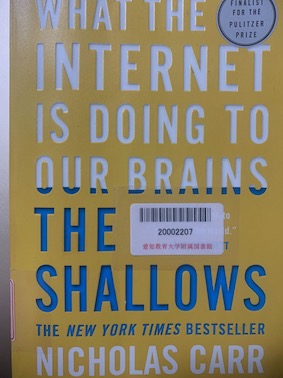
I read this book around the end of the
year/start of the year (2020-2021). Although basically dating
from 2011, the issues it raises certainly haven't gone away, but
have rather become even more prevalent.
The book's main focus is the effect of the Internet on people's
memories, illustrated with background on the brain's
workings. He shows how a heavy focus on online activity is very
different to the sustained concentration
involved in "deep reading". Such a heavy focus prioritises
short-term memories and impinges on developing
and reinforcing long-term memories. He goes as far as to write
that, "The Web is a technology of
forgetfulness." (193) In fact, it can become 'a vicious cycle',
meaning that, "As our use of the Web makes
it harder for us to lock information into our biological memory,
we're forced to rely more and more on
the Net's capacious and easily searchable artificial memory."
(194)
As the writer indicates, fear about and criticism of the effects
of technological change are nothing new.
He refers to an article by inventor, Lee de Forest, in 'Popular
Mechanics' in 1952 when he wrote about
how, "A melancholy view of our national mental level is obtained
from a survey of the moronic quality of
the majority of today's radio programs." (80) Further back in
time, he considers the effects of, and attitudes
towards the development of writing as a method of recording
thoughts and ideas and later, in turn, printing.
He particularly sees a sad decline in the escapism of fully
focussing on reading. As he indicates, this can
be seen in the traditional environment for discovering books, the
library. As he writes, "The predominate
sound in the modern library is the tapping of keys, not the
turning of pages....at the center stands the
screen of the Internet-connected computer; the printed word has
been pushed to the margins." (97-98)
Although he focusses more on reading, he also considers changes in
writing. While he indicates this
as something in the future, "Writing will become a means for
recording chatter." (107), we can already
see 'chat' as a kind of transcribed writing. For him, a
deterioration in style has resulted, "Our indulgence
in the pleasures of informality and immediacy has led to a
narrowing of expressiveness and a loss of
eloquence." (108)
In this wide-ranging work, he ranges across huge expanses of time,
to make parallels and bring up interesting
references. One in particular, is a reference to an article in
1889 when futurist, Edward Bellamy, foresaw that
people, "would carry around a tiny audio player, called an
"indispensable", which would contain all their
books, newspapers and magazines." (109)
However, there are points which I find difficult to agree with. Not
least having lived for so long in Japan, one is
his claim that, "People born into societies that celebrate
individual achievement, like the United States, tend,
for example, to be able to remember events from earlier in their
lives than do people raised in societies that
stress communal achievement, such as Korea." (196)
Finally, I am more inclined to agree with Wegner and Ward, writing
in 'Scientific American' in 2013, that,
"The advent of the 'information age' seems to have created a
generation of people who feel they know more
than ever before, they may know ever less about the world around
them." (237)
See the previous featured book
